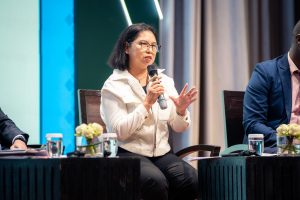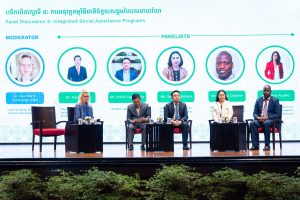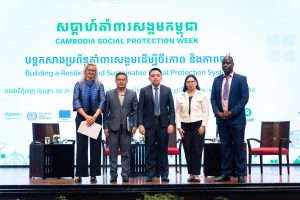
The flagship poverty reduction program of the national government, the Pantawid Pamilyang Pilipino Program (4Ps), played a significant role at Cambodia’s recently concluded Social Protection Week 2024. Held on March 12-13 at Sofitel Phnom Penh Phokeethra, the event gathered policymakers, development partners, and social protection practitioners to collaborate and exchange ideas on effective social welfare strategies.
Director Gemma B. Gabuya, National Program Manager of 4Ps, represented the Department of Social Welfare and Development (DSWD) on the second day as a panelist in the session titled “Integrated Social Assistance Programs” where she highlighted the Program’s sufficient institutional maturity and its crucial role as one of the largest social protection initiatives in the Philippines.  Additionally, Dir. Gabuya underscored the Program’s inclusivity and rights-based approach, positioning it alongside Cambodia’s National Social Assistance Fund (NSAF) and Brazil’s Bolsa Familia program for in-depth analysis of best practices and innovative approaches.
Additionally, Dir. Gabuya underscored the Program’s inclusivity and rights-based approach, positioning it alongside Cambodia’s National Social Assistance Fund (NSAF) and Brazil’s Bolsa Familia program for in-depth analysis of best practices and innovative approaches.
During the session, Dir. Gabuya shared insights on the recent advancements within the 4Ps program driven by the enactment of the Republic Act. 11310 or the 4Ps Act. “These advancements demonstrate the Program’s continuous evolution to address beneficiary needs more effectively,” said Dir. Gabuya, specifically highlighting the Kilos-Unlad Framework, a social case management strategy, and the program’s 7-year transformative learning path, which focuses on behavior change within families to promote long-term well-being. 
Beyond its core program components, Dir. Gabuya also underscored 4Ps’ growing emphasis on digital financial literacy. “This is very timely because we want to expedite the disbursement and release of grants to our beneficiaries, and we really want to develop their behavior in terms of spending, saving, and budgeting,” Dir. Gabuya noted.
Furthermore, Dir. Gabuya shed light on the Program’s adoption of a whole-of-government and whole-of-nation approach. She emphasized, “In terms of complementary services at the household level within the context of social case management, we really need to establish support from other government agencies such as the Higher Education,” highlighting the importance of partnering with higher education institutions to facilitate continued education for program beneficiaries beyond senior high school. 
Finally, Dir. Gabuya recognized the long-standing support of development partners such as UNICEF, World Bank, and Asian Development Bank, particularly in their contributions to reforms for the Program’s institutional systems.
This international exposure allows 4Ps to benchmark itself with successful programs in the region. The Program’s involvement in these exchanges of best practices establishes continuous improvement, allowing the Program to adapt and evolve to better serve its household beneficiaries.
